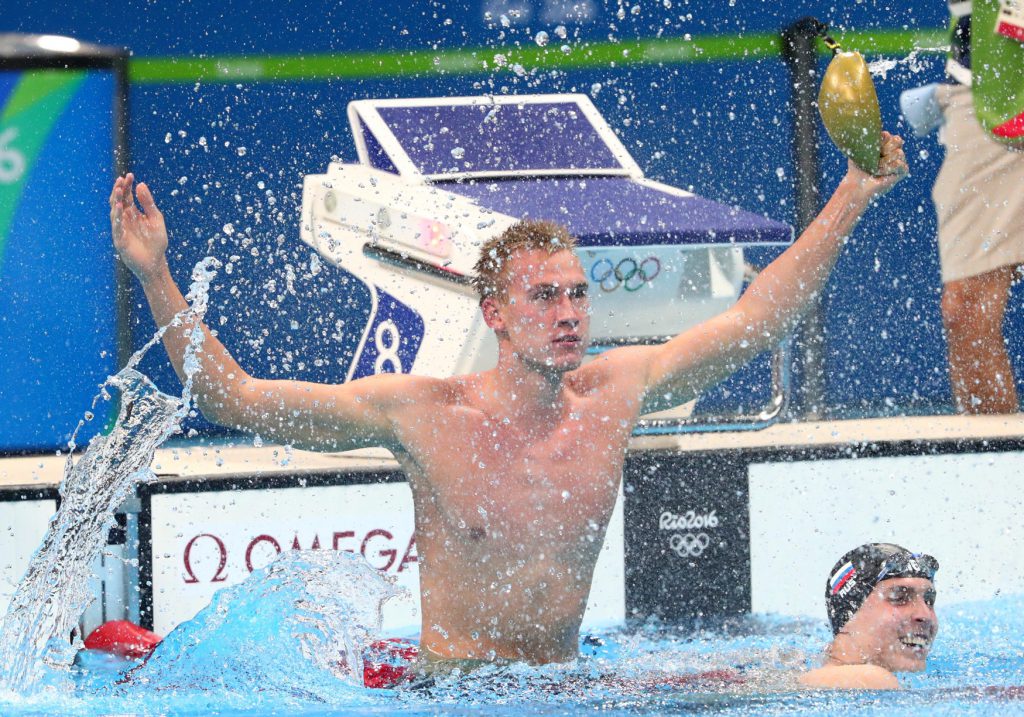Kazakhstan, Spain and Belgium Celebrate Olympic Firsts

Editorial Coverage Sponsored By FINIS
By David Rieder.
There was no Phelps, no Ledecky, no Hosszu. Oh sure, all three competed in tonight’s finals sessions at the Olympic Games in Rio, but unlike Tuesday, where the three lorded over their respective individual races, tonight’s finals were hard-to-pick affairs where winners could come from anywhere—any lane, even any country.
Right off the bat, one did.
Just about every qualifier for the 200 breast final was spoken of as a potential gold medal contender. Marco Koch in lane one was the defending World Champion. Japan’s Ippei Watanabe had posted the third-fastest time in history in the semifinals. The USA’s Josh Prenot had posted the second-fastest time in history at Olympic Trials last month. Russia’s Anton Chupkov, swimming in lane seven, was the popular spoiler pick.
Someone was bound to attack the race early and try to hang on—think Chad le Clos in the men’s 200 free—and that turned out to be Japan’s Yasuhiro Koseki, who was out a second under world record-pace at the 100 in 1:00.86. Koseki still led at the 150, but Prenot was closing fast.
And in lane eight, there was Kazakhstan’s Dmitriy Balandin. No one in the middle of the pool—particularly Prenot all the way over in lane three—had any idea he was out there, but Balandin was second at the 150 in 1:34.15.
“There is a positive and a negative side to swimming in the end lane,” Balandin said. “You don’t see your opponents. so it’s very hard to know how well you’re swimming. On the other hand, it’s a plus because when you don’t see them you can concentrate on your own race and not get distracted.”
Koseki faded down the last lap, falling all the way to sixth place, but Balandin held tough, staying just inches ahead of Prenot as the American’s signature closing speed kicked in. And he touched first, beating out Prenot for the gold by seven one-hundredths, 2:07.46 to 2:07.53.
Balandin had made history, becoming the first ever swimming medalist from Kazakhstan in only its sixth Olympic Games.
“This is the biggest honour and the biggest thing I could have given to my country. I’m very proud of that,” Balandin said. “It’s the first medal in swimming for Kazakhstan and I’m very happy that I’m the one that got it.”
Balandin’s upset victory came just a half hour after countryman Nijat Rahimov won gold in weightlifting, setting a world record for the 77-kilogram class. Those gold medals were the first two Kazakhstan has won in Rio, and that bumps their all-time gold medal total to 18. One-ninth of the country’s gold medals ever came on one night.
“I think all of Kazakhstan will be drinking tonight,” Balandin said.
Next up on the finals’ slate was the women’s 200 fly, and in lane five was Spain’s Mireia Belmonte, already a national hero in the sport. Prior to the London Games, Spain had won just four Olympic medals ever, and their only women’s podium finish came in 2000, when Nina Zhivanevskaya picked up a bronze in the women’s 100 back.
Even before coming to Rio, Belmonte was the national icon for her sport for the two medals she won in London four years ago (bronze in the 200 fly and silver in the 800 free). Belmonte already shown strong form in Rio with a bronze medal in the 400 IM Saturday on. On this night, the conditions were primed for her shining moment.
Australia’s Madison Groves led for much of the race, but Belmonte ran her down over the final lap and pulled even coming into the finish. She fully extended going into the wall while Groves chopped an extra half-stroke—and that made all the difference.
Belmonte won gold in 2:04.85, three one-hundredths ahead of Groves in 2:04.88.
Belmonte turned to see the scoreboard and could hardly believe what she saw.
“I don’t know how I’m feeling. It’s difficult for me to say. There are lots of emotions,” Belmonte said. “Winning an Olympic medal is a very special thing. The bronze was priceless for me, but a gold was my dream, and now it’s come true.”
And then, to wrap up the night’s individual action, there was the men’s 100 free, long considered swimming’s signature event, and the sport’s traditional powers were expected to go at it, with Americans Nathan Adrian and Caeleb Dressel facing off with Australia’s Cameron McEvoy and Kyle Chalmers.
Chalmers pulled off the win, breaking the World Junior Record with a 47.58. And then, finishing second out of lane seven was Belgium’s Pieter Timmers.
Timmers arrived in Rio having never broken 48, and he entered the final with a best time of 48.14 from the semifinals Tuesday night. But he pulled off the swim of his life at the best possible moment, beating out Adrian for the silver by five one-hundredths of a second, 47.80 to 47.85.
“I just knew I had a small chance to go for a medal,” Timmers said. “It was going to be so tight. You have to be mentally strong in that moment. To do it in 47 seconds, everything has to be right. I think I’m not the best swimmer in the finals here, but everything came together in the finals here.”
The medal was just the sixth Belgium has ever won in the sport of swimming and fifth among men. The most recent—and the only gold—had come in 1996, when Fred Deburghgraeve was victorious in the 100 breast in Atlanta.
In pursuit of his Olympic dream, Timmers left Belgium when he finished school and moved to train in Eindhoven, where he met two-time 100 free gold medalist Pieter van den Hoogenband.
“On the window [at the pool] was his time from Sydney, 47.84,” Timmers said, referring to the world record van den Hoogenband set in 2000 that lasted for eight years.
“I’ve seen that time a lot. For me that was a big time to crack here. I always had the wish to crack that. I did it. Finally. In the final race I could do it.”
In an Olympics where big names, the typical swimming nations, the pursuit of history and controversy have been the headline-grabbers, night five in the pool belonged to Cinderella. Three stars in their own country got their big moments in front of the rest of the world, edging out the mighty Australian and Americans, the steady British and Japanese.
Is that not the reason for the existence of the Olympic Games? Bringing the best athletes in the world together to represent their countries and their families to the best of their abilities with all eyes watching. Everyone gets their fair shot—this is not the NCAA Tournament, where one’s worthiness is questioned based on strength of schedule, quality wins and bad losses. Get the qualifying time, and wherever you come from, you get a lane.
Balandin, Belmonte and Timmers, none of them from swimming powerhouses, each had a lane for their respective finals this evening—any lane will do, as Balandin swam out of lane eight and Timmers lane seven—and that was all they needed.


- OFFICIAL SITE FOR RIO
- RIO COMPETITION SCHEDULE
- WHERE TO WATCH LIVE VIDEO OF OLYMPICS
- USA MEN'S SWIMMING TEAM
- USA WOMEN'S SWIMMING TEAM
- USA DIVERS GOING TO RIO
- USA WOMEN WATER POLO TEAM
- SWIMMING MEDAL PREDICTIONS
- FULL DAY 1 RESULTS
- FULL DAY 2 RESULTS
- FULL DAY 3 RESULTS
- FULL DAY 4 RESULTS
- FULL DAY 5 RESULTS
- FULL DAY 6 RESULTS
- FULL DAY 7 RESULTS
- FULL DAY 8 RESULTS
- WOMEN'S 10K OPEN WATER RESULTS
- MEN'S 10K OPEN WATER RESULTS
- FULL OLYMPIC SWIMMING RESULTS




Kazakhstan greatest country in the world.
All other countries are run by little girls.
Kazakhstan number one exporter of potassium.
All other countries have inferior potassium!